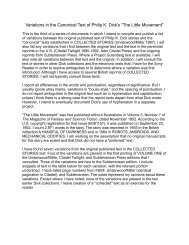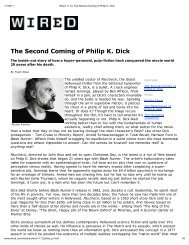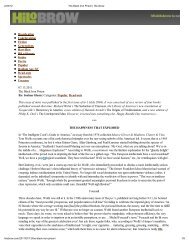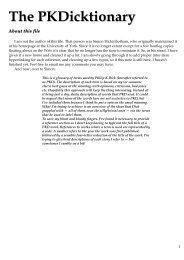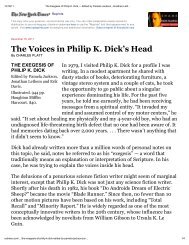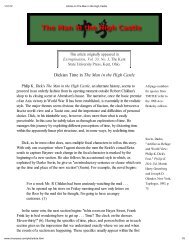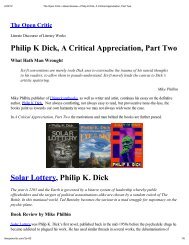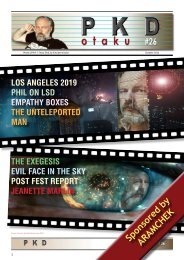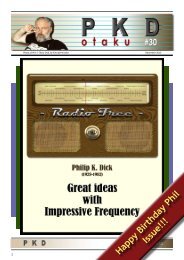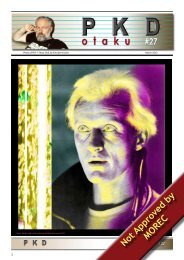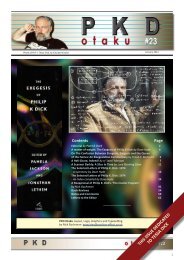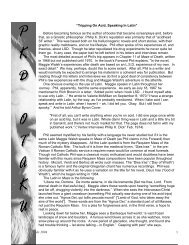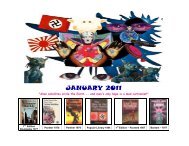Hermenaut - Philip K. Dick Fan Site
Hermenaut - Philip K. Dick Fan Site
Hermenaut - Philip K. Dick Fan Site
Create successful ePaper yourself
Turn your PDF publications into a flip-book with our unique Google optimized e-Paper software.
2/25/12 <strong>Hermenaut</strong>: <strong>Philip</strong> K. <strong>Dick</strong> | HiLobrow<br />
Increasingly preoccupied, as one <strong>Dick</strong> exegete notes, “with solitary anxieties and by a corresponding concern with unexplainable<br />
ontological puzzles,” <strong>Dick</strong>’s books in the ’70s were infrequent (for him), and more explicitly autobiographical than what had come<br />
before — but they just kept getting better. Flow My Tears, The Policeman Said (w. 1970, p. 1974) is set in a Nixonian “betrayal<br />
state” of police spies, advanced surveillance techniques (bugs, sensors, minicams, even tattoos), and narcotic intrigue; it concerns a<br />
TV star who loses his identity in an alternate universe… but really, it’s a love story. To his skeptical colleagues, all this was almost<br />
too realistic to be considered science fiction; the book still won sf’s John W. Campbell Memorial Award, however. <strong>Dick</strong> didn’t<br />
write again for three years.<br />
Staying up for days at a time wearing the same wrinkled and filthy Nehru jacket, eating frozen chicken pot pies and drinking<br />
protein-fortified milkshakes, downing fistfuls of “white crosses” and blasting opera music (while he inhaled gruesome amounts of<br />
snuff), <strong>Dick</strong>’s world was restricted to bikers, drug addicts, and teenage girls. In 1971 he was admitted to a psychiatric hospital,<br />
because he wanted protection from the FBI (CIA?) agents who were tapping his phone and going through his papers. Shortly<br />
afterward, his house was in fact burglarized — which only confirmed his fear that one of his books had inadvertently revealed a<br />
government secret. (<strong>Dick</strong> was also fond of acting more crazy than he was; he enjoyed telling people, for example, that the cat’s<br />
litter box was bugged.) Eager to get away from his own life, in 1972 he accepted an invitation to attend a Vancouver sf convention<br />
as the guest of honor, and fled carrying nothing but a suitcase, a trenchcoat, and a Bible.<br />
At the convention, <strong>Dick</strong>’s speech “The Android and the Human,” a summation of “an entire life-time of developing thought,” was<br />
well-received; shortly afterward he took an overdose of sedatives in an attempt to kill himself. He recovered, and was taken to a<br />
rehab center, where — after twenty years — he finally kicked his amphetamine addiction. Back in California he met and married<br />
an eighteen-year-old college student named Tessa, who put up with his wild rages, his agoraphobia, and intermittent physical<br />
abuse; with her, he had his third and last child. Now <strong>Dick</strong> started writing again, about his life among the speed freaks, and the result<br />
was A Scanner Darkly (1977), one of the greatest works of 20th century fiction. Set in a barely futuristic suburban LA of 1994, it<br />
tells the story of “Fred,” a disillusioned narc who enjoys the company of the addicts with whom he lives as “Bob” — whose own<br />
drug intake contributes to a toxic brain psychosis complicated by Fred’s new assignment… to spy on Bob. The book ends with a<br />
dramatic dedication to <strong>Dick</strong>’s many friends who’d been killed or permanently damaged by drug abuse; his own name is on the list.<br />
That same year <strong>Dick</strong> wrote to the Department of Justice, offering his assistance in Nixon’s war on drugs, because “drug-abuse is<br />
the greatest problem I know of.” Shortly afterward, United Artists paid <strong>Dick</strong> $2,000 for the film rights to Electric Sheep; the novel<br />
was, of course, eventually made into the shallow action movie Blade Runner.<br />
On February 3rd, 1974, shortly before the publication of Flow My Tears, while <strong>Dick</strong> was recovering from the sodium pentothal<br />
he’d received during oral surgery, the doorbell rang. It was a delivery person, a young woman who happened to be wearing a gold<br />
icthus (a groovy ’70s Christian fish symbol) on a chain around her neck. Somehow the sight of the fish, plus his mental state at the<br />
time, plus the sodium pentothal, added up to a weeks-long flood of visions (<strong>Dick</strong> saw the Roman world of the Book of Acts<br />
stacked “holographically” atop the present), visual hallucinations (“It appeared — in vivid fire, with shining colors and balanced<br />
patterns — and released me from every thrall, inner and outer”), and a constant stream of cryptic messages (like “The Buddha is in<br />
the park”), often from the radio. Later, having studied Orphic, Gnostic, Zoroastrian, and Buddhist thought, books on brain<br />
chemistry, and the Encyclopedia of Philosophy, <strong>Dick</strong> decided that he’d probably experienced “genetic memories,” or what Plato<br />
called anamnesis — the “recollection” of eternal truths. Or something.<br />
After these experiences, as he noted in his Exegesis (a lengthy, handwritten journal devoted to theorizing about the events of “2-3-<br />
74″), he realized that the world really was “cardboard, a fake,” and that it was his duty to take on “in battle, as a champion of all<br />
human spirits in thrall, every evil, every Iron Imprisoning Thing.” Of course, as with his earlier paranoia about government<br />
surveillance, <strong>Dick</strong> also made fun of his own convictions: Although often frantic and miserable, the Exegesis has its amusing, selfparodistic<br />
moments: such as the essay in it entitled, in the voice of Ubik, “The Ultra Hidden (Cryptic) Doctrine: The Secret<br />
Meaning of the Great Systems of Theosophy of the World, Openly Revealed for the First Time.” Still not funny to <strong>Dick</strong>, however,<br />
was his fear of authority; in fact, he began to inform on his sf colleagues, accusing them of being part of a Communist conspiracy<br />
— led by Stanislaw Lem, his great admirer — to kidnap him. Typically, although he mailed some of these letters to the FBI (they<br />
were ignored), he put others in a trashcan behind his house, assuming that whomever was watching him would deliver them.<br />
Professionally speaking — that is, despite his failing health and obvious mental “issues” — 1975 was the greatest year of <strong>Dick</strong>’s<br />
life. A long interview with his friend and admirer Paul Williams appeared in Rolling Stone, and two short interviews with Tony Hiss<br />
appeared in The New Yorker (after twenty-five years of writing, he’d finally made it into that magazine’s light-hearted “Talk of the<br />
Town” section). Crap Artist was published, his first mainstream novel to see print, and that same year he wrote “Man, Android<br />
and Machine,” an essay which sums up his philosophical speculation on the question, “What is Human?” (and which then veers<br />
wildly across his speculations about “orthogonal time”). Also that year, the scholarly journal Science-Fiction Studies published a<br />
special issue devoted to his work; full of New Left and neo-Marxist analyses of <strong>Dick</strong>’s Laingian, existentialist, and anti-capitalist<br />
themes, it provoked even more unwelcome visits from French intellectuals — whom he drove away by blasting Linda Ronstadt at<br />
top volume, and whose words of praise he invariably reported to the authorities.<br />
hilobrow.com/2011/10/05/philip-k-dick/comment-page-1/#comment-94685<br />
4/10



